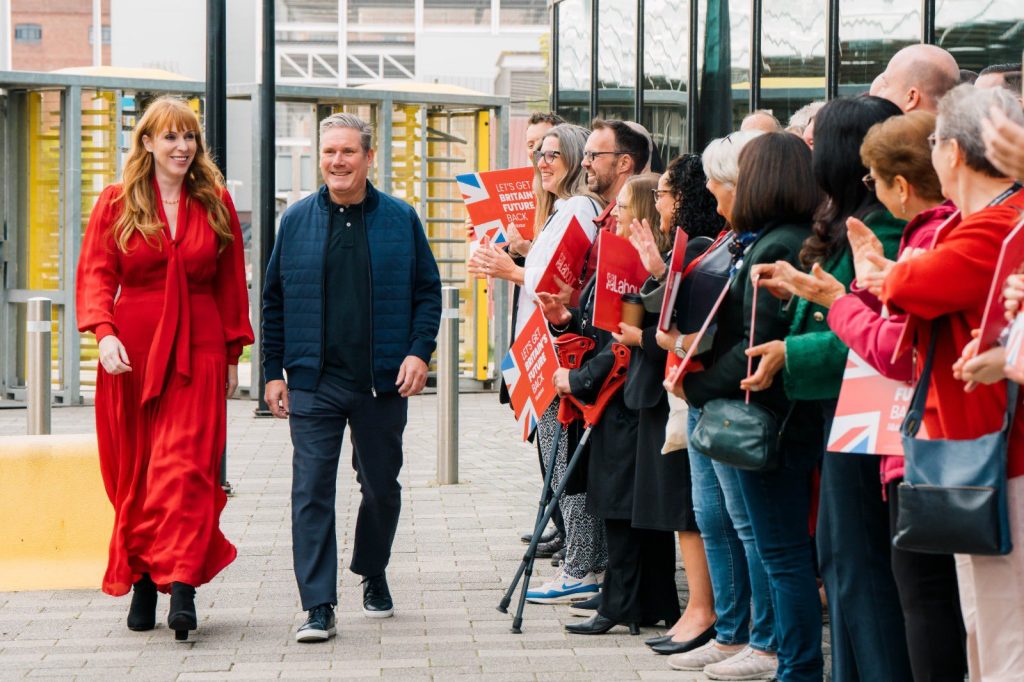After years in opposition, Britain’s Labour Party senses it’s on the verge of regaining power

Angela Rayner and Keir Starmer
LONDON: Members of Britain’s opposition Labour Party gather in Liverpool on Sunday for their annual conference with an unfamiliar feeling: optimism.
The party has been out of power for 13 years, and in the last national election in 2019, voters handed Labour its worst drubbing since 1935. But with an election due next year, polls put Labour as much as 20 points ahead of the governing Conservative Party, and Labour scored a morale-boosting special election victory in Scotland last week.
Power is within the party’s grasp — as long as it doesn’t mess things up.
Hello Liverpool!
Looking forward to kicking off this weekend by speaking at Labour's Women's Conference. pic.twitter.com/guFhTSwy8c
— Keir Starmer (@Keir_Starmer) October 7, 2023
“It was a big step in the right direction, an important one,” Labour leader Keir Starmer said Friday after the special election result. “But we accept this humbly. This is a step on the journey.” Labour’s landslide 1997 election victory under Tony Blair — the peak of its popularity — was a quarter-century ago, and the party has suffered four straight election defeats.
The Conservatives have been in power nationally since 2010, years that saw austerity following the world banking crisis, Britain’s divisive decision to leave the European Union, a global pandemic and a European war that has triggered the worst cost-of-living crisis in decades.
Those upheavals left both Britain’s main parties in turmoil — and both responded by picking populist leaders. Labour members elected the veteran left-wing lawmaker Jeremy Corbyn in 2015. The Conservatives, after years of division and wrangling over the country’s EU exit, chose brash Brexit-booster Boris Johnson and won a thumping election victory over Corbyn in 2019.
Corbyn quit after that defeat, and amid criticism that he’d allowed antisemitism to fester in a party that sees itself as proudly antiracist.
Starmer won a party leadership contest in 2020, vowing to restore relations between the party and the Jewish community. He also has steered the social democratic party back toward the political middle-ground after the divisive tenure of Corbyn, a staunch socialist who advocated nationalisation of key industries and infrastructure.
Starmer’s actions angered some grassroots Labour members who want a bolder agenda, but it has revived the party’s poll ratings. In a sign that corporate Britain is preparing for a change of government, Labour says companies have been queuing up to buy stands in the conference exhibition hall and to attend a business forum with Starmer and other senior party leaders.
In a speech opening the gathering, Deputy Leader Angela Rayner accused the Conservatives of presiding over “national decline” and being too consumed with internal political chaos to sort out the country’s problems.
”Rishi Sunak and his party have taken a sledgehammer to the foundations on which a good life can be built,” she said. ”And now the simple things in life are crumbling: a decent job, a secure, affordable home and a strong community.” The party has to walk a delicate line to convince voters it can ease the UK’s chronic housing crisis and repair its fraying public services, especially the creaking, overburdened state-funded National Health Service – but without imposing tax increases on the public.
The Conservatives, who held their own, rather muted conference in Manchester last week, have not given up hope. Conservative officials argue that voters are not sold on Starmer, a lawyer and former chief prosecutor with a cautious, managerial style. Prime Minister Rishi Sunak has depicted himself as a force for change, with Starmer as the face of the status quo.
But Sunak’s party has a big gap to close. The Conservatives are losing support across the country, from affluent southern voters turned off by Brexit to working-class northern voters who switched from Labour in 2019.
Labour is also gaining ground in Scotland, where its former dominance had been obliterated in recent years by the pro-independence Scottish National Party. Labour won an emphatic victory over the SNP in a special election Thursday for the parliamentary seat of Rutherglen and Hamilton West, near Glasgow. Starmer hailed it as a “seismic result.” “They said that we couldn’t change the Labour Party and we did it,” Starmer told local party workers. “They said that we couldn’t win in the south of England and the north of England, and we did it. They said You’ll never beat the SNP in Scotland’ – and, Rutherglen, you did it.” Rob Ford, professor of politics at the University of Manchester, said the polling figures are “stark” for the Conservatives. But he cautioned that voters remain “depressed and very sceptical” of all political parties.
“They are much more enthusiastic about the idea of turfing the Tories out than they are about putting Labour in,” Ford said. “Starmer’s own poll ratings remain pretty mediocre. People think he’s a bit weak, they think it’s unclear what he stands for, they’re not really sure what his vision is for government.
“What Labour really need to do with this conference is to convince people — to steal a line from Tony Blair’s 1997 campaign — that things can only get better.”
Source: Press Trust of India






